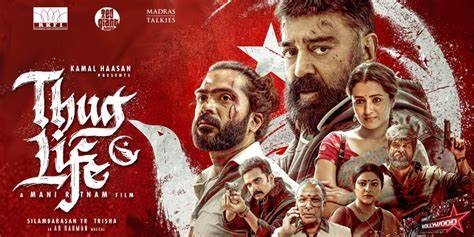Thug Life Movie Review: Kamal Haasan and Mani Ratnam’s Reunion Fails to Match Nayakan Legacy
Thug Life Movie Review: Kamal Haasan and Mani Ratnam’s Reunion Fails to Deliver the Magic of Nayakan
“Thug Life,” the much-hyped reunion film of legendary actor Kamal Haasan and iconic director Mani Ratnam after a 38-year-long wait since their classic “Nayakan” (1987), promises cinematic brilliance but ultimately falls short of expectations. Marketed as a magnum opus with an ensemble cast including Kamal Haasan, Silambarasan, Trisha Krishnan, Abhirami, Mahesh Manjrekar, Nassar, Ali Fazal, Sanya Malhotra, Aishwarya Lekshmi, Ashok Selvan, and Joju George, the film attempts to blend nostalgia, socio-political commentary, and gangster drama — but ends up delivering a convoluted, weary tale that fails to captivate.
Backed by Raaj Kamal Films International, Madras Talkies, and Red Giant Movies, the movie was originally known as “Kamal Haasan 234,” marking Kamal’s landmark 234th film. The title later changed to “Thug Life,” reflecting the protagonist’s journey, Rangaraaya Sakthivel Naicker — a character paying homage to the iconic Sakthivel Naicker from Nayakan. The plot revolves around Sakthivel’s repeated confrontations with Yama, the God of Death, symbolizing his indestructible aura in the gangster world. However, this mythical undertone fizzles out due to an overstretched and emotionally inconsistent narrative.
The story unfolds with Sakthivel being betrayed by rival gangster Sadanand (played by Mahesh Manjrekar) and arrested by the police during a botched meeting. A revenge subplot takes shape after Sadanand’s drug-abusing nephew humiliates his pregnant girlfriend (who is also Sakthivel’s niece), leading to her tragic suicide and the nephew’s subsequent killing by Sakthivel. While this angle initially promises an intense gangland rivalry, the screenplay diverts into melodrama and misplaced moral debates. A regressive moment emerges when Sakthivel is blamed by his brother Manickam (Nassar) for sending his daughter to college, suggesting a shocking and outdated view that education leads to tragedy for women.
As the story drags on, the narrative loses focus on the central rivalry and instead delves into internal family conflicts. Years ago, Sakthivel had rescued and adopted Amaran (Silambarasan), the orphaned son of a newspaper delivery man killed during a police shootout. Now grown up, Amaran is on a mission to find his lost sister, Chandra. Sakthivel helps him in this quest, even rescuing a woman named Indrani (Trisha Krishnan) from a brothel, believing she might be Chandra. Ironically, both Sakthivel and Amaran fall in love with Indrani, leading to a convoluted love triangle.
Kamal Haasan’s dual love interest — a loyal wife Jeeva (Abhirami) and mistress Indrani — adds to the character’s complexity, but also comes across as self-indulgent and superficial. Mani Ratnam introduces an inter-caste marriage subplot and attempts social commentary, but these elements feel more like checkboxes than organic storytelling devices. As Sakthivel emerges from prison, he finds Amaran and Manickam allied with his old rival Sadanand, and their betrayal sets up a tepid climax where emotional payoff is minimal.
The action sequences, especially the ones shot in snow-capped Nepal during Sakthivel’s trip to Mansarovar, are visually appealing but offer nothing groundbreaking. High-octane chases, car crashes, and gunfights are competently shot but lack novelty or emotional investment. Even AR Rahman, the maestro known for elevating Mani Ratnam’s films, delivers a forgettable soundtrack and background score that fails to resonate or enhance the story.
Kamal Haasan gives a performance that is solid but uninspired — powerful in moments, yet largely self-referential. Silambarasan adds energy but is constrained by an inconsistent script. Other actors like Sanya Malhotra are completely wasted in blink-and-miss appearances, such as a dance number that adds no value to the plot. By the end, Yama symbolically claims most of the characters, leaving Sakthivel alive but alone. The film closes on a repetitive note as Sakthivel discovers his namesake grandson from the inter-caste marriage, echoing the generational legacy theme from Nayakan.
Despite the ambitious scale, legendary cast, and high production values, “Thug Life” fails to justify the long wait and the legacy it attempts to carry forward. Mani Ratnam’s screenplay struggles under its own weight, and the film, rather than being a cinematic gem, ends up being a tired rehash of past glories with no real spark of innovation or engagement. For those expecting a milestone film from two of Tamil cinema’s finest, “Thug Life” turns out to be an underwhelming and forgettable experience.
For video news, visit our YouTube channel THE OLIGO.

